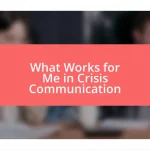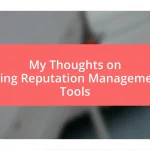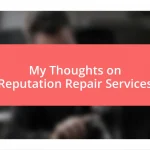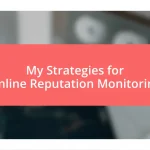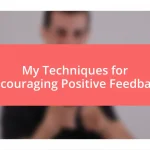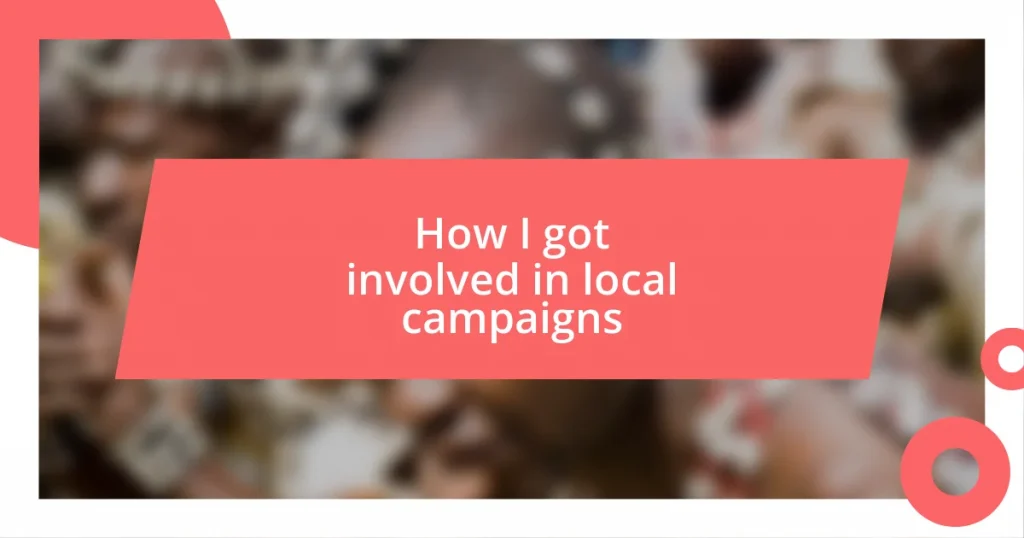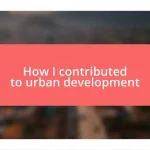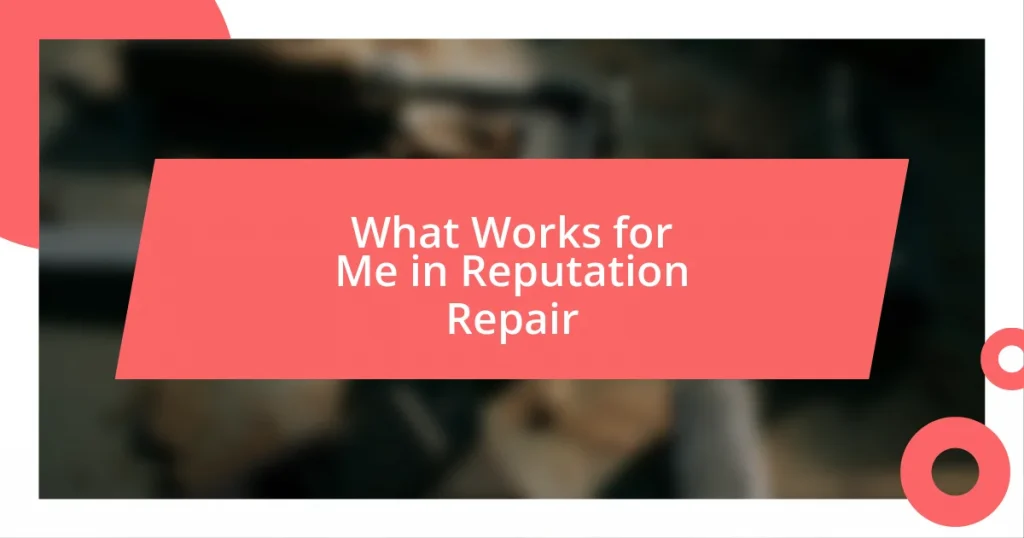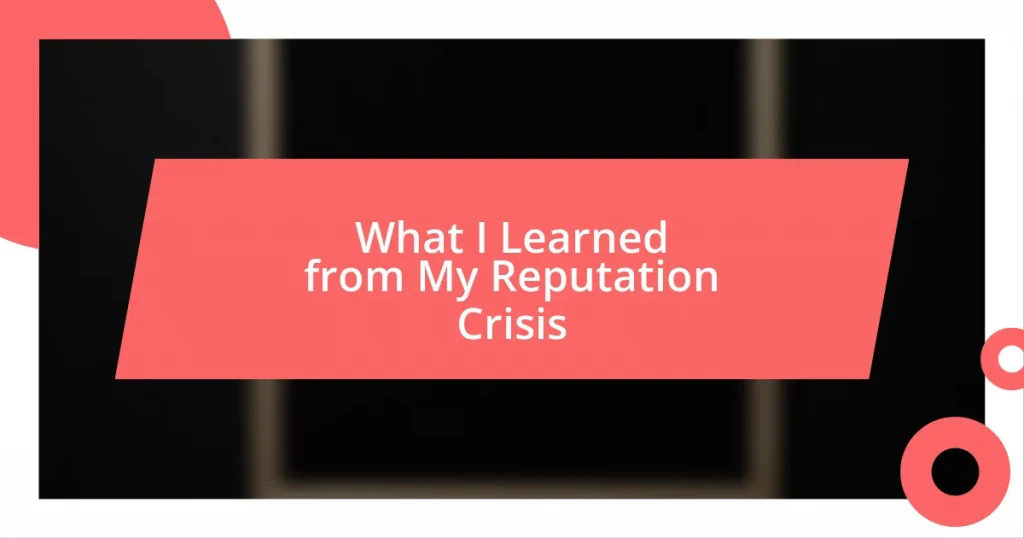Key takeaways:
- The author’s early exposure to social discussions and experiences with community issues ignited a passion for activism, highlighting the importance of critical thinking and recognizing the value of the arts.
- Engagement with local organizations provided mentorship, resources, and emotional support, transforming a sense of isolation into a strong community network dedicated to collective action.
- Taking initiative in addressing community needs, such as organizing clean-up events, taught the author that leadership is about fostering connections, empowering others, and valuing the journey alongside the outcomes.
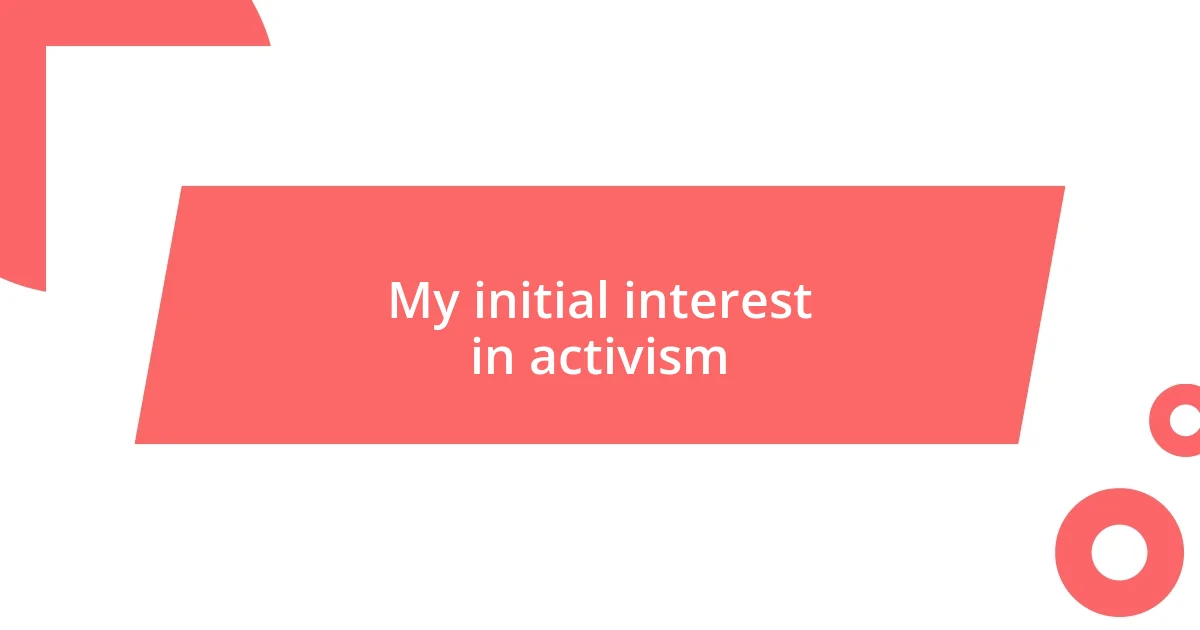
My initial interest in activism
I can still remember the day I attended my first community meeting. I walked in thinking it would be a simple check on what my neighborhood was up to, but what struck me was the passion in the room. That energy was contagious, and I felt a spark igniting within me—was this how change started?
Reflecting on my childhood, I grew up in a family that often discussed social issues at the dinner table. My parents would encourage us to think critically about our surroundings, but for the longest time, I didn’t realize how that foundation shaped my interest in activism. I remember feeling frustrated when my high school decided to cut funding for music programs. It was a huge part of my life, and I questioned why the arts seemed undervalued. Why did it take a crisis for us to recognize the worth of something that brought so much joy?
As I dove deeper into local issues, I found myself drawn to stories of individuals who had succeeded in enacting real change. I often asked, “What if I could make that kind of impact?” Every story of perseverance helped fuel my desire to contribute, and soon, I understood that taking action was not just a responsibility but a privilege.
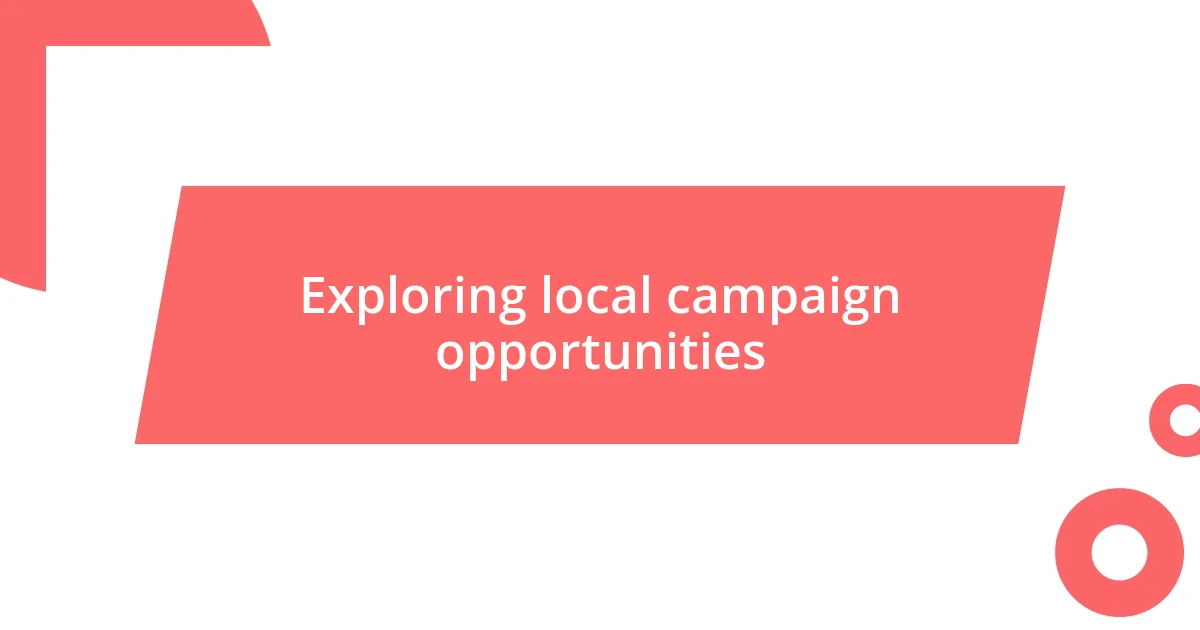
Exploring local campaign opportunities
Exploring local campaign opportunities often means stepping out of your comfort zone. When I first started, I attended a local rally, unsure of what to expect. I was blown away by the diversity of people eager to advocate for various causes—everything from environmental protection to social justice. Each campaign presented a unique opportunity to connect with my neighbors and learn about the pressing issues we faced together.
As I navigated this landscape, I discovered that local campaigns often rely on volunteers with different skills. There were opportunities for outreach, such as knocking on doors or managing social media accounts, and I quickly realized how my background in graphic design could make a difference. It was empowering to see how my creativity could help visual messaging resonate with a broader audience, bringing attention to critical local struggles.
After some careful observation, I noticed a theme: the best local movements prioritize relationship-building. I recall connecting with a veteran campaign manager who highlighted the importance of listening to diverse voices in the community. That experience underscored how exploring these opportunities meant not just joining campaigns but also joining in conversations that mattered to me and my neighbors.
| Campaign Type | Key Benefits |
|---|---|
| Environmental Initiatives | Connects with nature, addresses climate change. |
| Social Justice Movements | Advocates for equality, empowers marginalized voices. |
| Community Development Projects | Focuses on improving local infrastructure and services. |
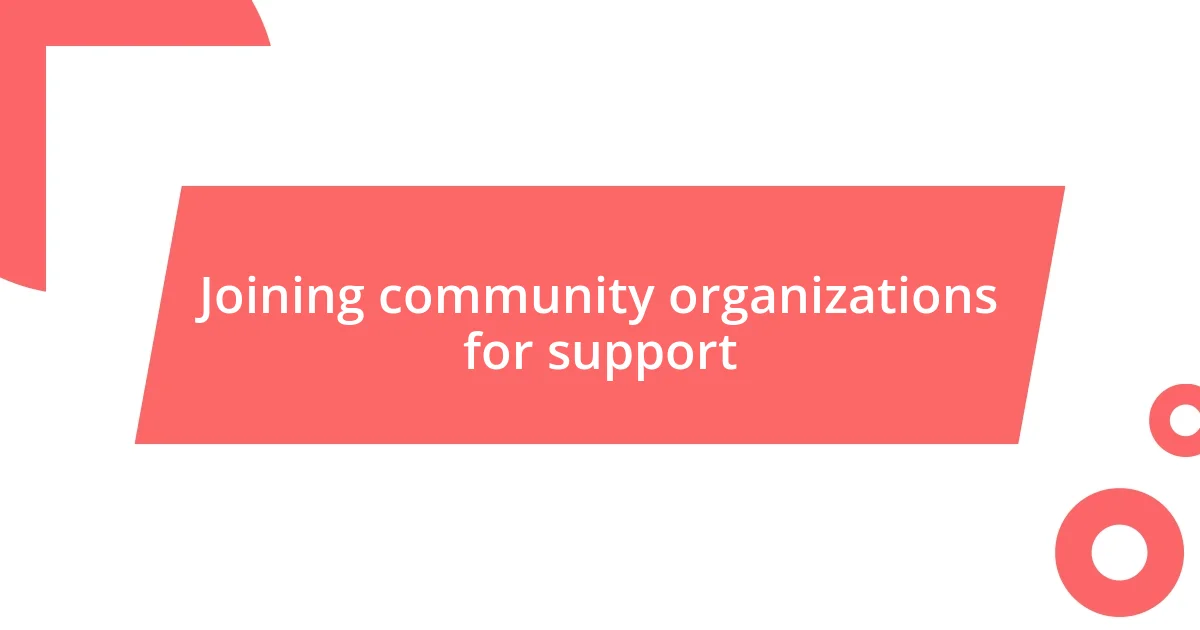
Joining community organizations for support
Joining community organizations can be a powerful way to access support and amplify your efforts in local campaigns. I remember feeling like an island when I first ventured into activism, but once I connected with local organizations, everything changed. There’s something incredibly comforting about being among like-minded individuals who share a mutual commitment to bettering the community. It transforms lonely ideals into shared action, creating a sense of belonging that I didn’t know I needed.
Engaging with these organizations opened doors to resources I hadn’t considered before. Here’s how they supported my journey:
- Mentorship Opportunities: Experienced activists offered guidance, sharing their trials and successes.
- Skill Development Workshops: Training sessions on public speaking and advocacy helped me gain confidence.
- Networking Events: I met diverse groups who taught me the value of collaboration and intersectionality within movements.
- Access to Resources: They provided materials, information, and contacts that vastly improved my campaign strategy.
- Emotional Support: Being part of a community made it easier to share frustrations and celebrate victories together.
With each meeting, I found not just friends, but a support network that fueled my motivation and commitment to the work ahead. It felt like being part of a larger tapestry, where each thread—each person—contributed to a powerful collective voice.
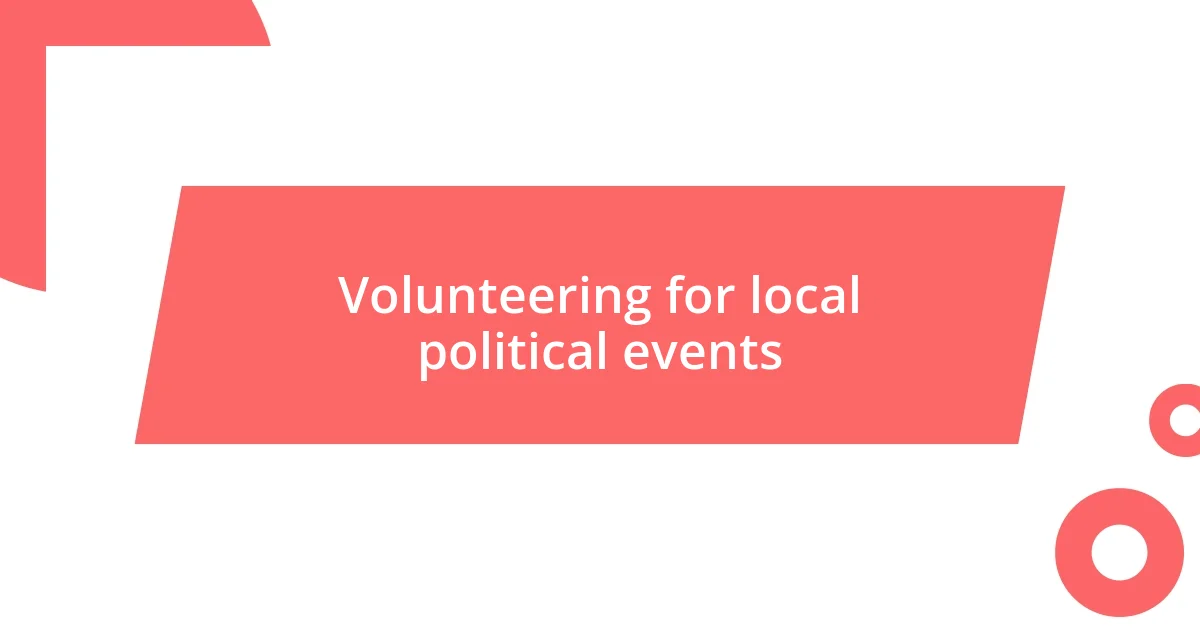
Volunteering for local political events
Volunteering for local political events not only opened my eyes to the vibrant nature of community engagement, but it also allowed me to immerse myself in causes I genuinely cared about. I remember the adrenaline rush of preparing for my first community forum. Standing behind the registration table, I felt a mixture of excitement and nervousness. Should I approach strangers to spark conversations or wait for them to come to me? Ultimately, I discovered that a warm smile and genuine curiosity were the best icebreakers—this simple act turned into countless meaningful discussions that deepened my understanding of local issues.
One memorable experience was canvassing for a local candidate alongside seasoned activists. Every door I knocked on felt like a mini adventure. Some homeowners welcomed us with open arms, eager to share their thoughts, while others were less enthusiastic. Through it all, I learned the importance of persistence and patience. I recall a woman who started off dismissive but ended up sharing her struggles with housing after I paused and listened. It was in those moments of vulnerability that we connected, showing me firsthand how deeply personal these political issues could become.
I’ve also attended several rallies, where the energy in the air was almost palpable. Each chant, each sign held high represented not just a cause but a community rallying together for change. The power of collective action hit me when I joined a march for educational reform. Surrounded by passionate voices, I felt a sense of unity that took my breath away. I realized then that volunteering isn’t just about giving your time; it’s about becoming part of a movement where every voice matters and everyone plays a role in shaping the conversation. Isn’t it exhilarating to think that your efforts could light the spark for massive change?
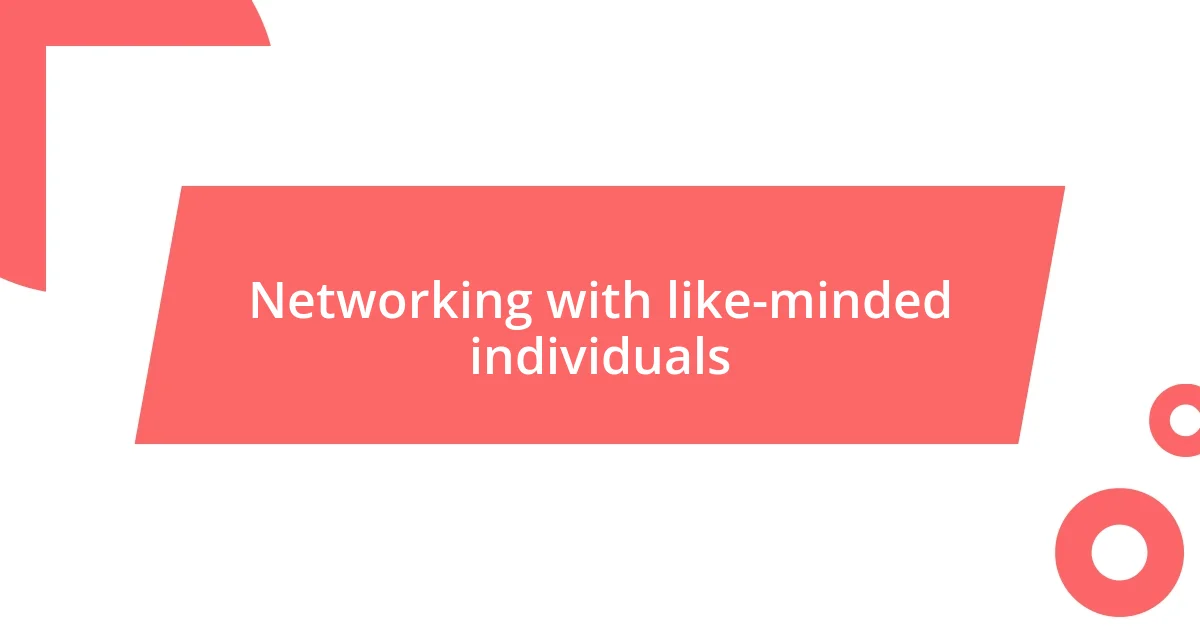
Networking with like-minded individuals
Networking with like-minded individuals has been a game changer in my journey through local campaigns. I vividly recall my first local meet-up. There I was, unsure of myself, but as I struck up a conversation with another attendee, I felt an immediate spark of connection. It was refreshing to find someone else who understood the nuances of community issues I often grappled with. This is the power of networking—it transforms lonely endeavors into a vibrant community.
One of the most enriching experiences I’ve encountered in networking is when I participated in a roundtable discussion on environmental advocacy. Sitting among others who shared my passion was invigorating. It was like we were all pieces of a puzzle finally clicking into place. Ideas flowed freely, and I gleaned insights that I would have never discovered alone. Have you ever felt that thrill when ideas merge and something truly impactful emerges? That’s the magic of surrounding yourself with people who share your vision.
Over time, I found that these connections also brought unexpected benefits. I remember receiving an unexpected message from a fellow activist offering me a spot on a panel at an upcoming event. At first, I felt apprehensive, but the encouragement I received from my network made me realize that people truly want to uplift one another. It’s in those moments—when your network believes in you as much as you believe in your cause—that your commitment solidifies. Isn’t it reassuring to know that there’s a whole community cheering you on?
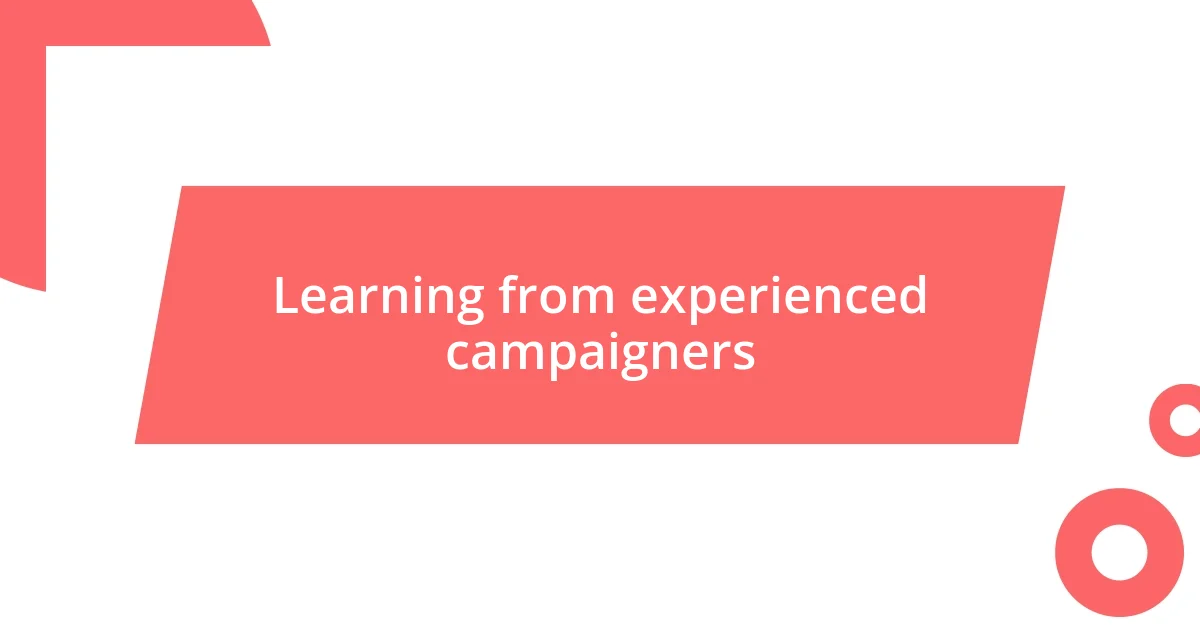
Learning from experienced campaigners
Learning from experienced campaigners has always been a cornerstone of my involvement in local campaigns. I remember attending a workshop led by a seasoned organizer who shared not just strategies, but stories filled with the highs and lows of campaigning. Listening to her recount the challenges she faced, I realized that setbacks are part of the journey, and each obstacle can be an opportunity for growth. Have you ever felt overwhelmed by the enormity of a task? It was comforting to understand that even the most successful campaigners have had their moments of doubt.
One particular moment that stands out to me was during a training session where we practiced pitch techniques. I watched as an experienced campaigner effortlessly connected with the audience, turning a simple speech into a heartfelt conversation. Inspired, I tried to emulate his approach, focusing on incorporating personal anecdotes that resonated with people. The realization hit me: authenticity isn’t just appreciated; it’s crucial in engaging others. Can you imagine the impact of sharing your own journey? It was a turning point for me, encouraging me to open up and connect on a deeper level.
Additionally, the mentorship I received from these experienced campaigners proved invaluable. I recall a time when I was feeling particularly lost on how to mobilize volunteers for an event. A mentor took the time to sit down with me, sharing her strategies and even her past missteps. That candid conversation changed the way I approached my campaigns. It’s amazing how a little guidance from those who have walked the path before us can illuminate our way forward, isn’t it? Their willingness to invest their time and knowledge inspired me to pay it forward, nurturing new campaigners just as they had done for me.
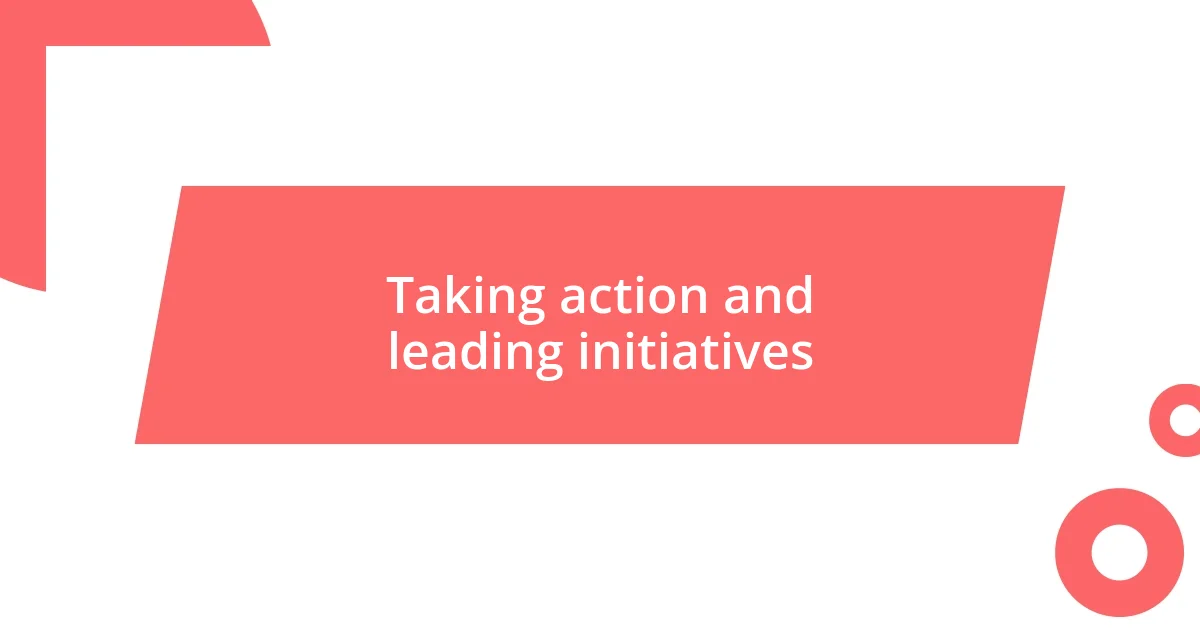
Taking action and leading initiatives
Taking action and leading initiatives often starts with recognizing a need in the community. I remember standing in my local park, noticing how neglected it had become. While others passed by without a second glance, I felt a surge of responsibility. Could I really make a difference? That question motivated me to rally a small group of neighbors, and as we put our heads together, we developed a plan for a community clean-up. The moment we saw our park transform was pure joy, reinforcing my belief that even small actions can lead to significant change.
Many people might feel hesitant to lead initiatives due to fear of failure, but my experience has taught me otherwise. I once organized a fundraising event for a local shelter and, while the numbers didn’t turn out as expected, the connections formed that day were invaluable. Engaging with participants, sharing stories, and exploring ways to support the shelter was more rewarding than any monetary goal. It made me realize that leadership isn’t just about results; it’s about fostering community bonds. Don’t you think that sometimes the journey is just as important as the destination?
As I continued to lead initiatives, I discovered the importance of empowering others. During a workshop I led for aspiring campaigners, one participant hesitated to share her innovative idea, fearing it might be too ambitious. I shared my early experiences of doubting my own ideas, and how some of those same doubts had nearly kept me silent. Seeing her face light up as she found the courage to present her suggestion was a pivotal moment for me. It reinforced the notion that taking action isn’t simply about being in charge—it’s about uplifting others to share their voices too, don’t you agree? That’s what true leadership looks like: creating a space where everyone feels empowered to contribute.

